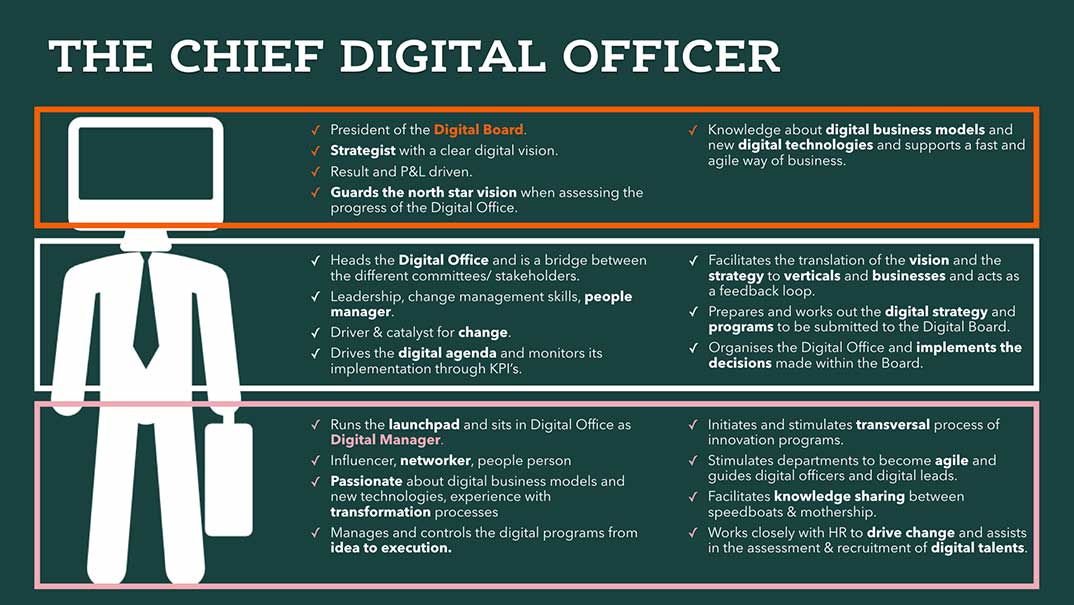Whoever thought that Digital Transformation was just another project, with a clear start and end date, may need to think again. It’s a permanent process, an exciting and never-ending journey.
Once you deal with one wave of disruption through the proper transformation, you may face another one.
Your organization needs a digital-savvy leader to deal with this. Your organization needs someone to continuously manage and lead the transformation, the Chief Digital Officer.
Do we already have a Chief Digital Officer?
What is a Chief Digital Officer?

The role of the Chief Digital Officer is quite new but has seen tremendous growth over the past few years.
The CDO is the person in charge of the digital strategy and programs of the entire organization, with the ultimate goal to make your organization as future-proof as possible.
A challenging but exciting job!
- You need strong leadership. The ideal CDO is a charismatic figure that can convince all the stakeholders to make the digital transformation happen.
- You need broad insights into disruptive business models, the market, new challengers and the overall impact of technology. The CDO is a real strategist, someone that can define new business models, deal with cultural shifts and is able to have others execute the strategy so that it leads to new structures and processes of the business.
- You need a transversal approach that includes many people and breaks down silos throughout the organization. The CDO must be able to operate in a large-scale business and effectively influence people across the entire organization.
- You need thorough digital knowledge: E-commerce, online transactional platforms, digital marketing, social media experience and mobile ecosystems. None of these should be secrets for the Digital leader.
If you want to understand how you can become the digital leader your company will need for a better tomorrow, don’t hesitate to get in touch with our teams 😉
The shift towards home delivery is providing troubling times for the retail sector. This is due to the high fixed cost model of the sector. The fixed costs fluctuate between 60% and 70% of the turnover. So a small loss of, for example, 3% revenue to home delivery represents an average of 2% less underlying operating profit. The net margin in the sector would drop to 1% on average. This means that about 30% of the stores would become loss-making. Few retailers have the cash reserves to sustain this for a long time. The independent entrepreneurs (franchisees), who have a lotof stores at some chains, might then be even more inclined to throw in the towel.
The last man standing
Within the next 10 years we expect that 30 to 40% of the supermarkets will have to close due to a lack of profitability. We therefore have to ask ourselves why the big retailers still keep opening new stores. After all, they have sufficient insight into the market to be able to properly assess the above dynamics.
There are two main reasons: a tactical and a strategic one. From a tactical point of view, it is very difficult to close stores without losing sales and market share. The remaining stores in the neighborhood would immediately pick up that turnover. Most consumers do not shop more than 3 to 5 km from where they live or work. Strategically, the last remaining retailers will acquire a stronger market position. Indeed, a large proportion of consumers continue to shop physically. Consequently, the remaining stores would become extra profitable. “The last man standing wins”.
We are on the verge of a revolution in the retail sector, of which the ever-increasing changes will leave a lasting impact. The stakes are rising, the risks are getting bigger. Whoever will ultimately be the winner depends on the vision, flexibility and resilience of the players within the sector. “The only way to win is to learn faster than anyone else” as Eric Ries says.
What you can read next
De 3 lessen uit de neergang van Blokker België
De 3 lessen uit de neergang van Blokker BelgiëIntroductie tot de Blokker Case Op 18 februari 2020 kopt De Tijd “Blokker trekt zich terug uit België”. De eigenaar Michiel Witteveen zei: “De jongste 5 jaar stonden de omzet en de resultaten van de Blokker-winkels in...
Re-born Duval Union Consulting becomes Scopernia
Re-born Duval Union Consulting becomes Scopernia "A new style of consulting needs a suitable name." Ghent, 18 February 2020 – The management of Duval Union Consulting announces, on behalf of CEO Nils van Dam and founders Jo Caudron and Dado Van Peteghem, that the...
Why you should rescope your strategy
Why You Should Rescope Your Strategy Summary: a video for those who do not like to read why my new book resonates with many decision-makers the need to create strategy on a higher level: from just dealing with competition in the traditional way, over following digital...



